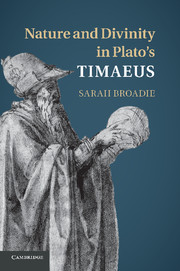Book contents
- Frontmatter
- Contents
- Acknowledgements
- What lies ahead
- Chapter 1 The separateness of the Demiurge
- Chapter 2 Paradigms and epistemic possibilities
- Chapter 3 The metaphysics of the paradigm
- Chapter 4 Immortal intellect under mortal conditions
- Chapter 5 The Timaeus–Critias complex
- Chapter 6 The genesis of the four elements
- Chapter 7 Divine and natural causation
- In conclusion
- Appendix on ‘parts of the paradigm’
- References
- General index
- Index locorum
In conclusion
Published online by Cambridge University Press: 05 December 2011
- Frontmatter
- Contents
- Acknowledgements
- What lies ahead
- Chapter 1 The separateness of the Demiurge
- Chapter 2 Paradigms and epistemic possibilities
- Chapter 3 The metaphysics of the paradigm
- Chapter 4 Immortal intellect under mortal conditions
- Chapter 5 The Timaeus–Critias complex
- Chapter 6 The genesis of the four elements
- Chapter 7 Divine and natural causation
- In conclusion
- Appendix on ‘parts of the paradigm’
- References
- General index
- Index locorum
Summary
While the chapters of this book are interconnected in various ways, I shall end by retracing aspects of one recurrent theme in particular: namely Plato’s concern to repudiate and build bulwarks – mythic but also conceptual bulwarks – against the kind of materialism exemplified by Empedocles and Diogenes of Apollonia. This type of materialism, unlike that of the fifth-century atomists, sees intelligence and purpose as fundamental causes of order in nature, and sites this intelligence and purpose in corporeal matter. Timaeus’s speech is crafted for people who share this bent for thinking in terms of cosmic Intelligence, but it provides them with a ‘better way’ of realising this type of world-view than the way of the earlier teleological materialism.
The figure of the separate and transcendent Demiurge replaces the notion of one or more material principles immediately invested with soul, mind, intelligence, purpose. The figure is inspired, of course, by that of the human craftsman who brings skill to bear on separate materials, ‘persuading’ them to fall in with his purpose – this being a purpose they could not possibly have set for themselves. For better or worse, this new model of world-making gives carte blanche for infusing cosmology with the most refined human values of formal beauty and intellectual fitness. It frees the teleological approach to roam well beyond its starting point of data consisting in patterns and functional arrangements that are obvious in the world of our experience. Such familiar natural structures may be seen as clear evidence of a superhuman intelligence at work in the natural world, and they may elicit from theorists enormously ingenious attempts to explain the mechanisms by which the structures are realised. But they suggest no clear paths of extrapolation to more recondite cosmic values such as the invisible mathematical beauties of Timaeus’s particles and the series of ratios by which the Demiurge defines, in parallel, the cosmic soul and our rational souls, thereby also laying the trail for human intellectual salvation. By, in effect, placing us in the world-making perspective, the figure of the separate Demiurge encourages us not to hold back in envisaging a cosmos framed to satisfy our own a priori criteria of fitness and perfection, which may be as esoteric in their rigour and sophistication as our intellectual powers and education can encompass.
- Type
- Chapter
- Information
- Nature and Divinity in Plato's Timaeus , pp. 278 - 283Publisher: Cambridge University PressPrint publication year: 2011



